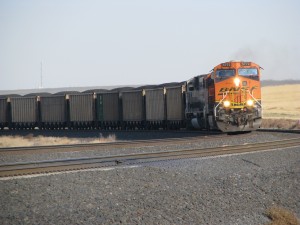June 22, 2012
Coal Train effects on Passenger Trains in the Northwest Corridor
On June 15, Transportation Choices Coalition hosted one of its Friday Forums at the downtown Seattle YMCA. The topic was Coal Train effects on Passenger Trains in the Northwest Corridor. This issue arises from proposals to site up to six coal export terminals in Puget Sound, along the Pacific Coast or on the Columbia River. The coal would move to these terminals via rail from the Powder River Basin coal fields in Wyoming and Montana.
The panelists were:
- Ross Macfarlane, Climate Solutions
- Bruce Agnew, Cascadia Center for Regional Development
- Floyd McKay, emeritus professor of journalism, Western Washington University
Here are a few highlights from each panelist’s presentation:
Mcfarlane
- There are practical and profitable solutions for countering climate change, but his organization has decided to oppose these coal export projects.
- Coal burning in the U.S. is in free fall. Over 30% of existing plants in our country are expected to close in the next decade and many others are switching to other fuels such as natural gas.
- Exports to Asia are needed to maintain coal mining at existing levels.
- There are four main issues that need to be addressed: Highway traffic, Marine traffic, the capacity of our rail system, and who pays for the needed mitigation.
Agnew
- We need to channel the enthusiasm of young people lined up against coal export terminals into support for passenger rail service.
- Coal exports are a part of the Obama Administration’s goal to double U.S. export.
- There are capacity challenges throughout our transportation network.
- If we don’t move now on pushing for the 3rd Seattle-Vancouver Amtrak Cascades round-trip we may lose the opportunity because the capacity won’t be there.
McKay
- Amtrak service may end up as collateral damage if coal train traffic growth increases dramatically, especially if a terminal is built at Cherry Point (near Bellingham).
- Will the large ongoing public investment in BNSF infrastructure for passenger train capacity end up being used to provide more freight capacity?
- We need to fully analyze BNSF claims that various improvements are needed for expanded passenger train service and not for freight expansion.
- A programmatic EIS needs to be done that covers all projects and impacts together, not just a specific EIS for each project.
An expanded report will be in the August/September All Aboard Washington newsletter.

